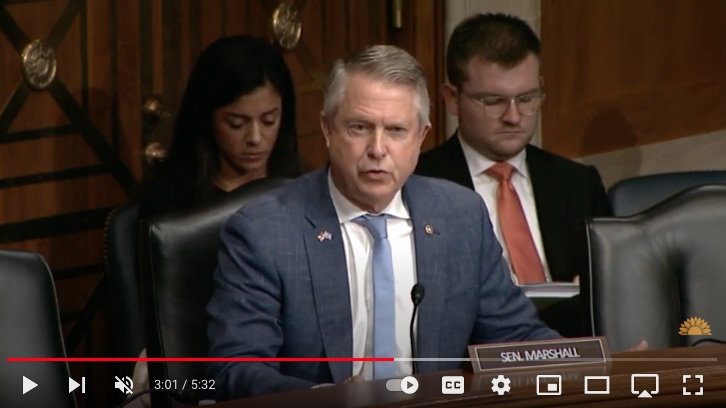- October 18, 2023
ICYMI: Senator Marshall Raises Serious Questions For NIH Director Nominee
Washington, D.C. – U.S. Senator Roger Marshall, M.D. had the opportunity to question Monica Bertagnolli, M.D., President Biden’s nominee to serve as Director of the National Institutes of Health (NIH) at a Senate HELP Committee hearing this week. The Committee is scheduled to vote on Dr. Bertagnolli’s nomination on October 25th.
Senator Marshall covered multiple topics central to Kansas’ legislative achievements, legacy, and values. He set the record straight in protecting one of the most successful laws penned by the late Senator Bob Dole which helps spur medical innovation through public-private partnerships at the NIH. Senator Marshall also addressed NIH funding disparities that have consistently prioritized institutions in coastal states over the Midwest. Finally, he discussed his concern for the Biden Administration’s embrace of gender reassignment surgeries on minors and questioned Dr. Bertagnolli about her stance on taxpayers funding unethical transgender research and gender reassignment surgeries.

You may click HERE or on the image above to watch Senator Marshall’s questioning.
Highlights from Senator Marshall’s questioning include:
On Prioritizing Midwest Research:
Senator Marshall: I want to talk about research. In 2022, nearly half of all NIH funding went to institutes in just five states and they happen to all be on the coast. I think that when we send all that research in one or two geographical locations, you have incest, you have decreased randomness of thought, and it pickles things up. The University of Kansas Cancer Center is second to none, NCI designated Comprehensive Cancer Center since 2012, The Kansas State University received the NIH funding in 2021 to support it becoming a national leader in emerging infections, Children’s Mercy Research Institute in Kansas City, advancing the genomic medicine, developmental behavioral health and pediatric brain cancer research. Will you commit to actually correcting these issues so innovative research in the Midwest is equally prioritized?
Maria Bertagnolli: Not only will I commit, I can give you an example of where my past work is really, already tried to achieve this. When I ran a cancer clinical trials group, one of my main goals was to make sure those trials reached as many communities as we possibly could. And we partnered with a wonderful physician practice in Laredo, Texas, serving the border community, a wonderful physician who served the Oglala Sioux community at Pine Ridge Indian Reservation, and a wonderful oncologist in my own hometown of Rock Springs, Wyoming. So I agree with you completely. NIH research has to reach everywhere, and there are many, many centers of great excellence that we should have the ability to engage.
On Taxpayer Funded Research Being Done on Transgender Surgeries and Research:
Senator Marshall: Should taxpayers fund gender reassignment experiments or research that are purely cosmetic, where you destroy healthy tissue and organs, or when they use FDA approved products off label with significant negative irreversible impacts? Again, this off label use isn’t treating diseases or illnesses. Should taxpayer funds be used to do research or fund these irreversible, horrifying, irreversible procedures and the use of these hormones off label?
Maria Bertagnolli: So Senator, thank you very much, because it’s very clear that you share my concern over the well being of the LGBTQ community, especially young, vulnerable people. What I can tell you is that if confirmed, I will commit to leading NIH to conduct the research that will achieve the very best health for these vulnerable –
Senator Marshall: Sorry to cut you off, but right there. Do you believe that it’s okay to fund this type of research where these irreversible procedures are being done? Do you think there’s any experiment that you can think would justify irreversibly damaging these poor little boys and girls, who are 14, 15 years old? Will you fund that type of research?
Maria Bertagnolli: Any research that we do, Senator, with regard to human subjects has to be done in a way that does no harm and produces the maximum benefit to the people that are participating in the research.
